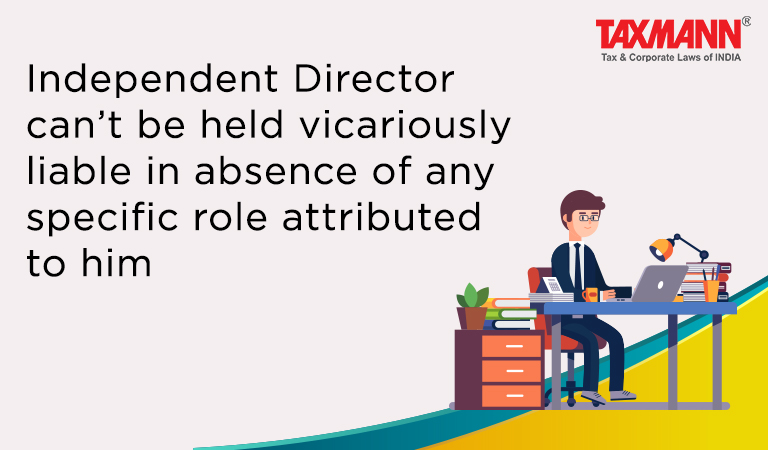Independent Director can’t be held vicariously liable in absence of any specific role attributed to him
- Blog|News|Company Law|
- 2 Min Read
- By Taxmann
- |
- Last Updated on 23 February, 2022

[2022] 135 taxmann.com 241 (Article)
Non-executive director / independent director
1. A non-executive director is a member of a company’s board of directors who is not part of the executive team. A non-executive director typically does not engage in the day-to-day management of the organization but is involved in policymaking and planning exercises.
An independent director is also a non-executive director who does not have any pecuniary relationship with the company, its promoters, and senior management or affiliate companies, is not related to promoters or the senior management, and/or has not been an executive with the company.
The provisions relating to the appointment of Independent directors are contained in Section 149 of the Companies Act, 2013 should be read along with Rule 4 and Sub-section (6) of section 149 spells out that an independent director in relation to a company, means a director other than a managing director or a whole-time director or a nominee director, and who in the opinion of the board, is a person of integrity and possesses relevant expertise and experience. Further, the Companies Act 2013 has also prescribed code for independent directors in its schedule IV pursuant to sub-section (8) of section 139 of the Companies Act 2013.
For listed companies, the appointment of independent directors is governed by SEBI (Listing Obligations and Disclosure) Regulations 2015 which is in a similar line with the provisions of the Companies Act 2013 with few stricter compliances.
Nominee directors
2. Nominee director is also a non-executive director in a company. Nominee directors can be appointed by certain shareholders, third parties through contracts, lending public financial institutions or banks, or by the Central Government in case of oppression or mismanagement. The extent of a nominee director’s rights and the scope of supervision by the shareholders, is contained in the contract that enables such appointments, or (as appropriate) the relevant statutes applicable to such public financial institution or bank. However, nominee directors must be particularly careful not to act only in the interests of their nominators, but must act in the best interests of the company and its shareholders as a whole.
The fixing of liabilities on nominee directors does not turn on the circumstances of their appointment or, indeed, who nominated them as directors. Whether nominee directors are required by law to discharge such duties or bear such liabilities will depend on the application of the legal provisions in question, the fiduciary duties involved and whether such nominee director is to be regarded as being in control or in charge of the company and its activities. This determination ultimately turns on the specific facts and circumstances involved in each case.
Click Here to Read the Complete Article
Disclaimer: The content/information published on the website is only for general information of the user and shall not be construed as legal advice. While the Taxmann has exercised reasonable efforts to ensure the veracity of information/content published, Taxmann shall be under no liability in any manner whatsoever for incorrect information, if any.

Taxmann Publications has a dedicated in-house Research & Editorial Team. This team consists of a team of Chartered Accountants, Company Secretaries, and Lawyers. This team works under the guidance and supervision of editor-in-chief Mr Rakesh Bhargava.
The Research and Editorial Team is responsible for developing reliable and accurate content for the readers. The team follows the six-sigma approach to achieve the benchmark of zero error in its publications and research platforms. The team ensures that the following publication guidelines are thoroughly followed while developing the content:
- The statutory material is obtained only from the authorized and reliable sources
- All the latest developments in the judicial and legislative fields are covered
- Prepare the analytical write-ups on current, controversial, and important issues to help the readers to understand the concept and its implications
- Every content published by Taxmann is complete, accurate and lucid
- All evidence-based statements are supported with proper reference to Section, Circular No., Notification No. or citations
- The golden rules of grammar, style and consistency are thoroughly followed
- Font and size that’s easy to read and remain consistent across all imprint and digital publications are applied



 CA | CS | CMA
CA | CS | CMA
